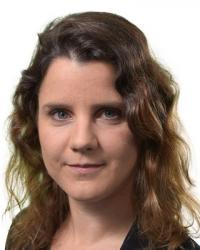Five Questions to the PhD Supervisor

Our professors also tell what personal and academic qualities they seek from a good PhD student in their major and tell us why one should pursue a PhD in their field
Supply Chain Management and Social Responsibility
Professor Gyöngyi Kovacs
Describe the PhD studies within your major (courses, seminars, co-authoring, publishing)?
We have a very active research group that organises doctoral courses and frequent research seminars for doctoral students in our major (Supply Chain Management and Social Responsibility). We also have a very good network with other research groups and participate in joint seminars, and organise joint courses e.g. through KATAJA but also other groups. Publications are key to our success. Researchers at our unit edit the Journal of Humanitarian Logistics and Supply Chain Management, and participate in the organisation of various conferences - e.g. CR3+, EDSI, NOFOMA. Our PhD students are encouraged as well as supported in their publication endeavours - they typically publish at least one journal article / year. Co-authoring is much encouraged, though PhD students shall also publish single-authored articles in line with Hanken's regulations for a doctoral degree.
What personal and academic qualities should a good PhD Student within your major have?
PhD students in Supply Chain Management and Social Responsibility should be pro-active, outgoing, professional in approaching others, team players, and people who do not shy away from field work and work together with companies and various types of organisations - NGOs, UN agencies etc. They are our face to the world; therefore their approach to managing such connections is crucial. We are seeking critical thinkers, good writers, and people who can work in projects as well as drive projects. Academic writing is key.
How do you collaborate with your PhD students?
We work in projects together, we conduct field work together, organise seminars, conferences, travel with them, and most importantly, write with them - and have a lot of fun while doing so. Where appropriate, we incorporate PhD students in our teaching and in our projects, and we encourage them to visit other universities in our network. We introduce them to a network of researchers as well as organisations as it fits their own projects and studies.
Why should one pursue a PhD within your field?
There are many different reasons to pursue a PhD within our field. There are those who aspire to an academic career, others would like to pursue work in industry or the humanitarian community. We try to align the supervision and the advice we give PhD students with their own career aspirations.
Most importantly, a PhD in our field is a way for personal development and learning! That said, it is of utmost importance to us that our research is not only rigorous but is also relevant to the community it addresses.
Where do PhDs within your major place themselves on the job market (academia vs. corporate sector)?
Our PhD alumni have placed themselves either within academia (in Finland and abroad), industry (e.g. the Finnish Railways, VR), or are employed by humanitarian organisations (e.g. UNOPS).
Marketing
Professor Peter Björk
Describe the PhD studies within your major (courses, seminars, co-authoring, publishing)?
All doctoral students in Marketing complete four in-house doctoral courses: 1) 'Managing the Research Process', which introduces you to the requirements of a doctoral thesis, thesis defence, article writing and publishing, as well as graduated students’ experiences and tips. 2) ‘Service and Relationship Management’, which examines contemporary research in service. 3) 'Quality in Research: Philosophies, Methodologies and Qualitative Methods', which introduces you to philosophical perspectives, with an emphasis on qualitative research. 4) A literature course on the construction of theory in marketing. These courses comprise about half of the required course work. The other courses (in Finland or abroad) are chosen in collaboration with your supervisor to support your methodological and theoretical knowledge development. We strongly encourage you to take a number of research methods-related intensive courses at Hanken and our partner universities, so as to build strong methodological skills in either quantitative, experimental, or qualitative methods. In addition, there are regular departmental seminars, with visiting local (Hanken and other universities) and international researchers.
What personal and academic qualities should a good PhD Student within your major have?
You should be open-minded, self-disciplined, and ambitious. Good writing and analytical skills are essential. We strongly support new thinking and theory building, which means that smart questioning of established truths, including theories launched by our researchers, is encouraged.
How do you collaborate with your PhD students?
As a PhD student in marketing, you will become a member of a very active international research community and work closely with distinguished professors. The first article, which you are encouraged to start constructing already during your first year of studies, is often co-authored with the supervisor. We support the use of various methods and are equally happy to help you with quantitative and qualitative research. We support you in building a competitive CV that makes you stand out in international competition for academic posts. We introduce you to a network of researchers that fit your research project, and encourage visits to foreign universities in our network.
Why should one pursue a PhD within your field? Where do PhDs within your major place themselves on the job market (academia vs. corporate sector)?
You should pursue a PhD if you feel passionate about scientific research, are interested in teaching, wish to make an international academic career, excel at academic writing, enjoy learning about and meticulously employing empirical methods, and you have the self-discipline, patience and tenacity that are required to complete a high quality thesis in four years.
Upon graduation, our PhDs with a focus on academia have been placed as post docs, lecturers, and assistant professors (in Finland and abroad). PhDs with business interests have been placed as managers, consultants and decision makers in private companies and public organizations.
Management and Organisation
Professor Denise Salin and Professor Sören Kock
Describe the PhD studies within your major (courses, seminars, co-authoring, publishing)?
All PhDs in Management and Organisation are recommended to complete four initial doctoral courses: 'Managing the Research Process' (which introduces ways of doing research and getting organised in that process), 'Perspectives on Organisations' (which, as the title suggests, examines different approaches to studying organisations and management), 'Quality in Research: Philosophies, Methodologies and Qualitative Methods' (which combines theoretical concerns with an introduction to qualitative methods), and a course on quantitative data analysis. In addition, each student completes other more hand-picked courses to suit their specific research needs and interests. These latter courses may be in Finland or elsewhere. In addition, there are regular departmental seminars, with many visiting local and international speakers, as well as a number of more specific research groups.
Doctoral students are strongly encouraged to publish and to present their work at international conferences during their doctoral studies. More generally, there is a high level of international publishing in Management and Organisation with many articles, chapters and books being produced by faculty and researchers.
There is a large variety of topics supervised and faculty are involved in a number of different fields. These include, but are not limited to, HRM, organisational behaviour, organisation theory, gender and diversity, strategy, and CSR. Many researchers in the subject of Management and Organization belong to one of two of Hanken’s Areas of strength: Leading People for Growth and Well-Being or Responsible Organizing. In our department we also have an area of high potential which is Strategic and Entrepreneurial Praxis. Doctoral students are strongly encouraged to join the activities of these groups if there is a fit with their research interests
What personal and academic qualities should a good PhD Student within your major have?
Resilience, analytical and critical thinking, and a strong curiosity about organisations and management, and how they work in theory and in practice. Students also need good communication skills, especially the ability to write text in fluent English.
How do you collaborate with your PhD students?
The most important issue is regular availability as a supervisor; this is important throughout the process, but often especially so at the beginning in clarifying and setting up the project, and then in the final stages of writing and submission of the thesis. Some students work very independently on projects they have developed themselves, others are involved in larger research projects together with faculty. Students get regular feedback on their thesis projects and articles and get help and advice on writing funding applications. All doctoral students are strongly encouraged to publish, either on their own or together with faculty from Hanken and/or other research institutions. Doctoral students typically have two supervisors; a few have three. Furthermore, doctoral students are also given the opportunity to take part in teaching and thereby develop their teaching skills.
Why should one pursue a PhD within your field?
In terms of the subject of management and organisation, there are many reasons, but centrally there is the issue of the importance of organisations and management in the world today, and the intense thrill of working on complex questions of theory and practice. At a general level, I would say one should only do a PhD if you have a true desire to do so. It is tough challenge, and for most people more demanding than they first imagine.
Where do PhDs within your major place themselves on the job market (academia vs. corporate sector)?
Many continue with research and teaching, while others go to consultancy or management in business or the public sector.
Entrepreneurship, Management and Organisation
Professor Joakim Wincent
Describe the PhD studies within your major (courses, seminars, co-authoring and publishing)?
The major in entrepreneurship encourages PhD candidates to develop strong skills for a fruitful career in our field. This implies not only intellectual capacity, this also includes valuable knowledge for the future regardless if they continue in academia or industry. We offer and coordinate international courses in our main topic, train our PhD candidates to develop strong skills in scientific thinking and in scientific methods, and encourage our PhD candidates to travel and develop competitive knowledge by participating in conferences, working and co-authoring papers with highly skilled international researchers. We have close collaboration with other geographically close institutions such as the Aalto University and a broad international network, which opens up to collaboration opportunities, such as research visits and joint studies.
What personal and academic qualities should a good PhD Student within your major have?
A PhD candidate should have analytic skills, be persistent in solving and working with challenging scientific problems, oriented towards learning new things, and be positive. We strive to be excellent, but also to have fun at work.
How do you collaborate with your PhD students?
A typical collaboration could be in co-authoring academic papers and reports, but also discussing potential solutions to the challenges the PhD candidates face with their individual research projects. We also help our students to find funding for their work.
Why should one pursue a PhD within your field?
The importance of entrepreneurship is increasing. This implies a need for highly educated persons willing to take on challenging consultancy projects for private companies, highly educated policy-makers with deep insights in the mechanisms with which entrepreneurship can be stimulated and how its effects can be enhanced, as well as for scientists who can create the next generation of frameworks and models of entrepreneurship.
Where do PhDs within your major place themselves on the job market (academia vs. corporate sector)?
A PhD in entrepreneurship opens up for getting interesting and challenging jobs in both academia, the corporate sector, and also important roles in the public sector.
Commercial Law
Professor Nari Lee
Describe the PhD studies within your major (courses, seminars, co-authoring and publishing)?
Hanken’s PhD studies in intellectual property law consists not only of thesis but also course works, in order to allow students to gain fundamental knowledge about the methodologies and perspectives in intellectual property research. The courses are often taught by external visiting professors from other European universities as well as the US law schools.
Thesis in law traditionally has been a single author monograph based dissertation, as it is often the tradition in legal research, requiring students not to publish their manuscript before thesis defense. Commercial law at Hanken allows students to choose a composite thesis, following the guidelines set by Hanken, which allow students to publish parts of their thesis. Co authorship is allowed, if students choose composite thesis as well.
Students are also encouraged to participate in doctoral workshops and seminars arranged by the Nordic Intellectual Property Network, as well as our other collaborating academic research institutes, and European and international IP offices such as EUIPO and WIPO. In addition to this, Hanken hosts the IPR University Center, which is a national joint universities research forum that allows doctoral students to network with other doctoral students working on the topic of intellectual property in Finland. Students are also invited to participate in academic research projects. Commercial law currently (2020) has one large scale research project on Fairness, Morality and Equality in European Intellectual Property Law (FAME-IP), which I lead.
What personal and academic qualities should a good PhD Student within your major have?
We seek students who have demonstrably sound previous knowledge in intellectual property law and policy, (shown by specialized IP Master’s program), with excellent academic transcripts and a publishable master’s thesis, as well as with methodological willingness to experiment with cross-disciplinary methodologies. As the program is quite independent, we are looking for students who are seriously interested in learning, and capable of following through a research project independently.
How do you collaborate with your PhD students?
We encourage students to take own initiatives to follow through their own projects. As law researchers often have a tendency to write works under single authorships and in the form of monographs, it is not so common to jointly author a paper for thesis supervisor with PhD students. However, if there happens to be serendipitously similar research interests with faculty members, students may collaborate with faculty members and get additional financing by partially working as research assistants. Furthermore, advanced students are encouraged to do joint research leading to joint publications and participate in academic research projects and teaching.
Why should one pursue a PhD within your field?
A master’s degree specializing in intellectual property has been popular in Europe. During the master studies, one learns fundamental IP law knowledge. To deepen one’s academic knowledge to participate in discourses on how the law and policy on IP should develop, one needs to pursue PhD level research. Furthermore, to differentiate oneself in the job market in Europe for IP experts, a PhD would be beneficial.
Where do PhDs within your major place themselves on the job market (academia vs. corporate sector)?
Our PhDs are both in academia and in practice (law). Due to the nature of the discipline, if the students have practiced law before pursuing a PhD, they are likely to go back to legal practice. However, as the doctorate degree tends to encourage students who want to get into academia, I would say more graduates are in the academia.
Economics
Describe the PhD studies within your major (courses, seminars, co-authoring, publishing)?
A PhD education in economics is a gate both into a research career and into demanding expert positions in the private and public sector as well as at international institutions.
If you choose pursue Ph.D in Economics at Hanken, you will join both Hanken's Department of Finance and Economics, which offers teaching in economics, finance, and statistics, and Helsinki Graduate School of Economics (Helsinki GSE), which is an academic initiative bringing together economics units from three Finnish universities – Hanken School of Economics, Aalto University and the University of Helsinki.
Doctoral studies in economics at Hanken are a part of Helsinki GSE PhD program. The Helsinki GSE PhD program offers a solid training in economics, comparable to the best international Ph.D. programs.
Read a full description of the program.
What personal and academic qualities should a good Student within your major have?
Ph.D. studies in economics require analytical skills and interest and ability to learn new quantitative tools and methods. It also is good if the student is both curious and creative as well as dedicated to put effort. At times, Ph.D. studies in economics may require persistence to work hard.
We also value good communication skills, especially ability to produce analytical text and to communicate fluently in English, and willingness to contribute to one’s social environment and collaborate with peers.
How do you collaborate with your PhD students?
We support our PhD students constantly throughout their studies. We advise them in the planning of studies, give feedback on thesis projects and articles, provide help and backup for applications of scholarships, are occasionally co-authors in research projects/papers, act as their mentors during their PhD studies, and help them to find a job upon graduation.
Why should one pursue a PhD within your field? Where do PhDs within your major place themselves on the job market (academia vs. corporate sector)?
The future prospects of PhDs in economics are very good. Typical first jobs upon graduation are demanding economist and expert positions in both private and public sector. A career in academia or applied research institutions is also a good option.
Finance
Describe the PhD studies within your major (courses, seminars, co-authoring and publishing)?
PhD students in Finance take the Graduate School of Finance core courses in theoretical asset pricing, empirical asset pricing, theoretical corporate finance, and empirical asset pricing. On top of that, the typical course choices include methodology courses both at Hanken and courses offered by FDPE (Finnish Doctoral Program in Economics). Our students can also select courses offered in other Scandinavian countries by other Nordic Finance Network member schools.
We have a joint seminar series with Aalto University, which brings top researchers from around the world for our Monday seminars that are housed at Aalto every autumn and at Hanken every spring. Our PhD students have opportunities to present their own research at departmental seminars, workshops arranged by the Graduate School of Finance twice per year, and at the Nordic Finance Network conference, that rotates through Scandinavian countries.
Our recent students have had both sole-authored studies, and studies co-authored with Hanken faculty and faculty in other universities.
What personal and academic qualities should a good PhD Student within your major have?
PhD studies in Finance are challenging, and a solid quantitative background helps a student in getting through the course work. Students who have an insufficient background in Finance from their Master's studies are required to supplement that by taking Master's level courses.
How do you collaborate with your PhD students?
We treat PhD students as valued colleagues at the department. PhD students in Finance are typically assigned two thesis supervisors who guide students' progress towards completion of the doctoral thesis. As mentioned above, it is not uncommon for students to have co-authored works with faculty.
Why should one pursue a PhD within your field?
A PhD in finance should be pursued by those who are ready to be challenged intellectually. A prospective PhD student needs to have a desire to create new knowledge through research.
Where do PhDs within your major place themselves on the job market (academia vs. corporate sector)?
We place students in both academia and corporate sector. Our recent PhD graduates are working both in academic institutions and at financial institutions around the world.
Accounting
Describe the PhD studies within your major (courses, seminars, co-authoring, and publishing)?
The courses provided in the Hanken PhD programme in accounting are a combination of nationally co-organized courses with KATAJA / Graduate School of Accounting and courses organized by our Nordic business school partners. Moreover, our students actively take part in international EIASM courses.
What personal and academic qualities should a good PhD Student within your major have?
Talented students with good analytical skills who are interested in profound theories of business such as accounting. Accounting underlies and forms the basis for how businesses and regulators co-work to establish more functioning environments for businesses to develop themselves.
How do you collaborate with your PhD students?
Team-work in larger research groups.
Why should one pursue a PhD within your field?
Our major is very practical-oriented, providing high analytical skills. These skills are highly useful when thinking about a career in business after the PhD.
Where do PhDs within your major place themselves on the job market (academia vs. corporate sector)?
Both academia and corporate sector.






